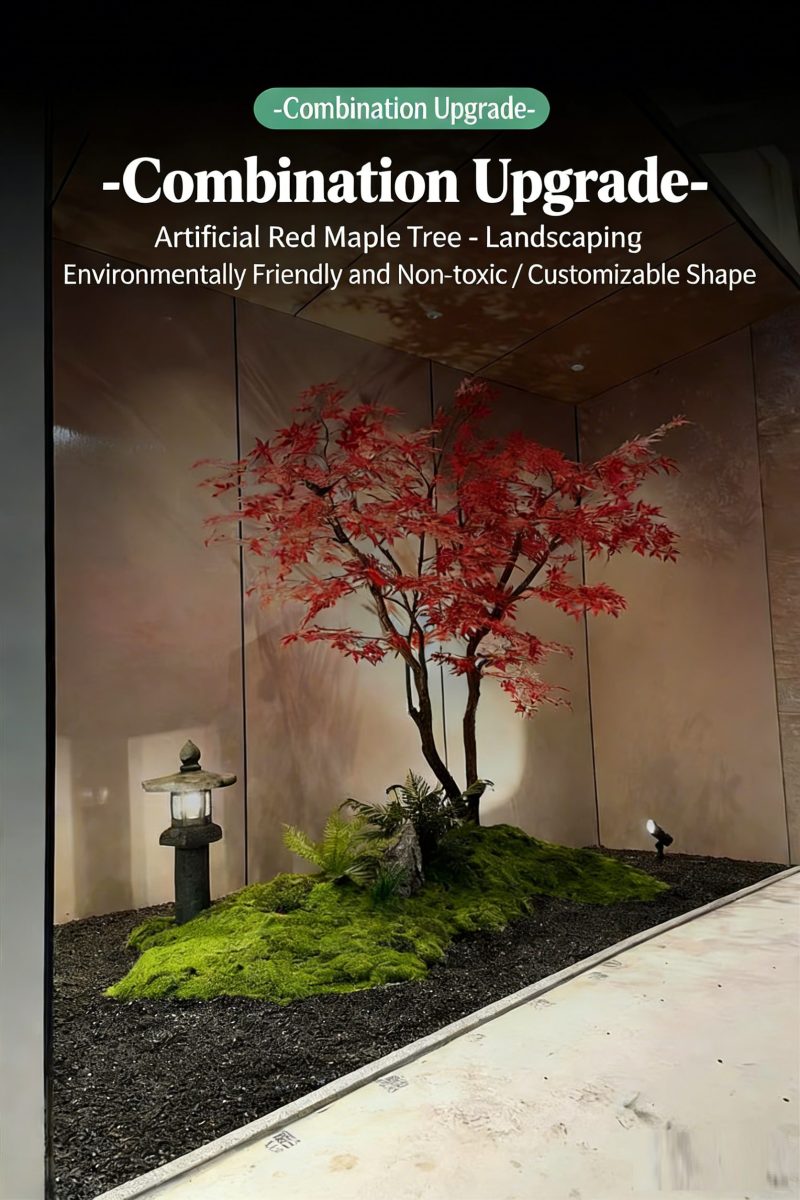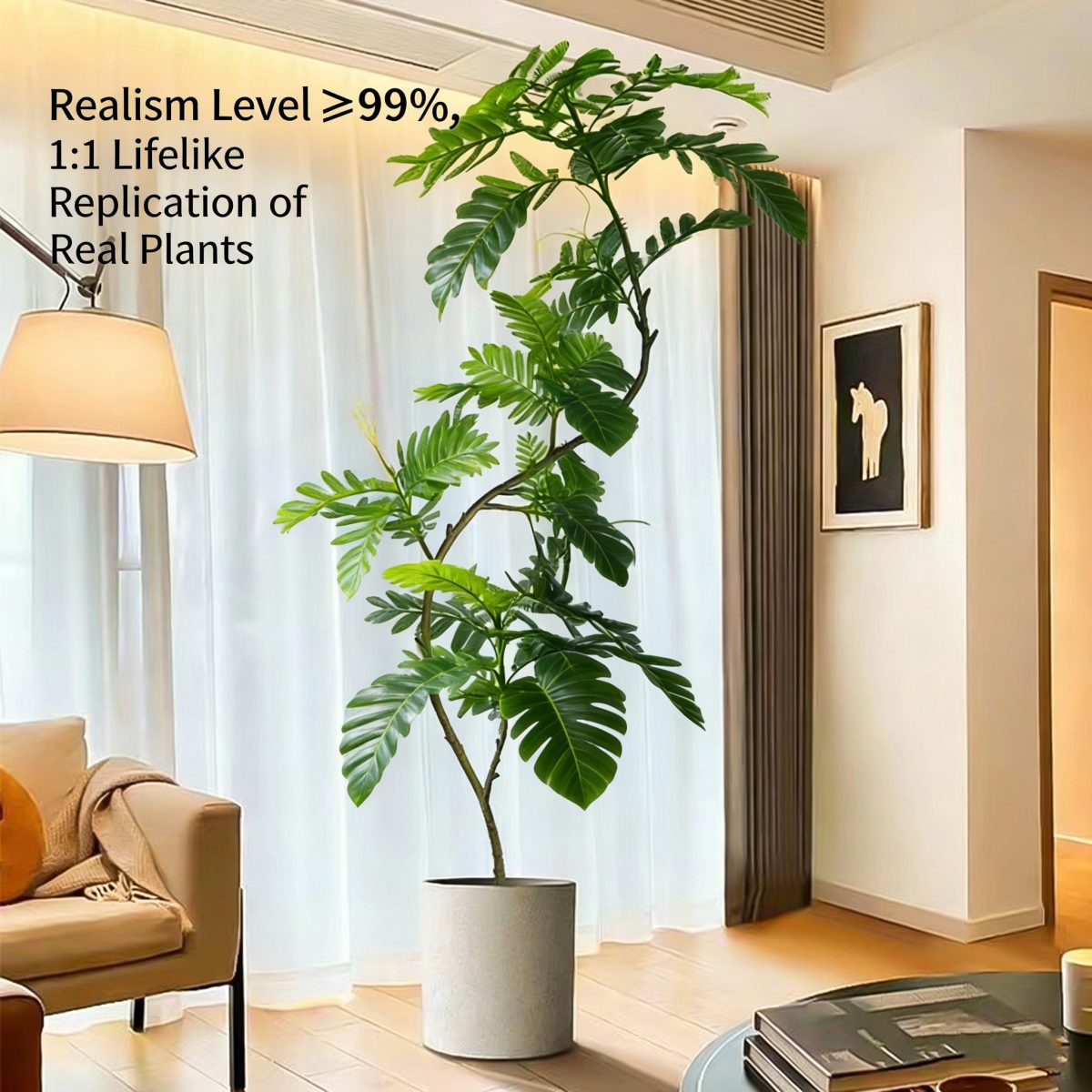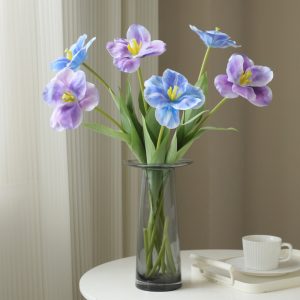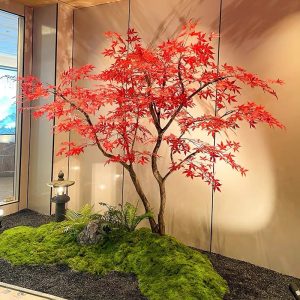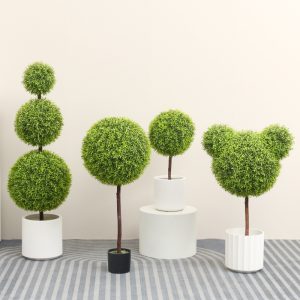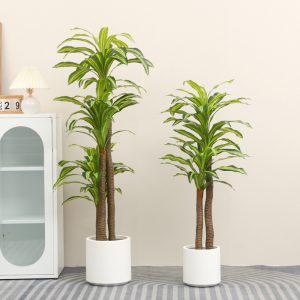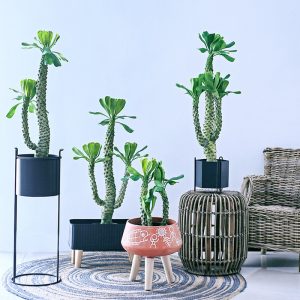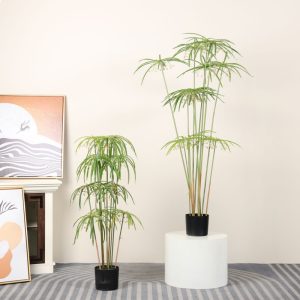Saturday, November 8, 9:12 AM.
The suburban house in Boston had just woken up to sunlight. I placed a warm cinnamon roll on a wicker tray, skirt brushing the walnut coffee table, and caught a glimpse of deep green behind the sofa—a tall monstera plant casting a patterned shadow across the cream brick fireplace.
The air smelled of butter, cinnamon, and cedar smoke curling from the hearth. There was also a hint of cool greenery—surprisingly, from the faux plant itself. I reached out and pressed a split leaf. The edge curled naturally, the surface was cool, with crisp veins like a newly grown leaf.
Exposed wooden beams stretched across the ceiling, an iron chandelier hung above, twined with dried eucalyptus. The gray velvet sofa was piled with camel-toned pillows. Across the room, the record player played Autumn Leaves, the needle making the occasional soft “tick.”
The monstera stood between the sofa and the floor-to-ceiling windows. Its ribbed gray ceramic pot matched the oak flooring—one light, one dark. The main stalk tilted slightly toward the light, with several new leaves at the top still curled into tight cones.
My husband always jokes, “You’ve finally retired from killing real plants.”
It’s true—I’d already overcooked one and drowned another. But this one? No worries. Not bothered by the cat, the heating, or my forgotten watering schedule.
The doorbell rang just as the record hit an interlude.
Sara stepped in, paper bag in hand, burgundy trench coat wrapped tight against the cold. “What did you bake? It smells amazing out there.” She kicked off her shoes, but her eyes were glued to the green.

“Wow, this one’s thriving!”
She measured a leaf with her hands, then gave it a squeeze. “Wait—hard?”
“Fake,” I smiled, handing her a mug of warm apple cider.
Sunlight fell through the perforated leaves onto the carpet like a scattering of coins. She circled the pot twice. “It looks even more real than a real one—the fuzzy texture on the back is insane.”
Even the cleaning lady had been fooled. The pot surface was topped with faux moss and pebbles, realistic as fresh soil.
“No leaf drop? No bugs?” Sara crouched to peek.
“Nothing. Three months in, it’s unchanged.”
I nudged aside a leaf that had started brushing the sofa. “Last Thanksgiving, someone spilled juice into the pot—wiped clean in a second.”
Sara clapped. “I need one for the study.”
She called home, saying, “Search for a monstera you don’t have to water.” Then gave me a wink. “Send me the link later.”
The clouds parted, and the sun hit the top leaf just right. A few drops of faux dew glistened along its edge.
Sara frowned—so I grabbed the mist bottle and gave it another spritz. The water beaded and slid right off. The floor stayed spotless.
After she left, the house settled into stillness.
I pulled out old photos. This corner had been empty just a year ago. Now, with the plant in place, it felt like the room was breathing again.
That afternoon, I nudged the sofa closer to let more light hit the leaves.
The ones at the base were a dark forest green, midsection slightly lighter, and the curled tips tinged with yellow-green. The holes varied in shape. A few faux aerial roots clung to the trunk—no wonder it tricked everyone.
At sunset, orange light poured in. I sat with a cup of tea, reading by the window. The leaf shadows danced softly on the wall, just like the old parasol tree in my grandmother’s courtyard long ago.
Later that night, I came home from work. Moonlight silvered the leaves. The tree stood just as upright—not like real ones that shed leaves in protest.
On weekends, I like to have breakfast by the bay window, watching sunlight climb up the leaves.
Sometimes, I wipe them gently with a soft cloth—not because they’re dirty, but because I want to feel the veins again.
My husband teases, “You care more for that fake tree than you do for me.”
I shrug. “Well, it always looks alive.”
From the kitchen before dinner, I glanced over—the neighbor’s real monstera had shed a carpet of leaves.
Mine still looked like summer.
I’m already planning: string fairy lights around it for Christmas; maybe add faux birds-of-paradise next summer.
Someday, when we have a kid, I’ll tell them:
“This is a tree that never grows old, and never cries when it’s knocked over.”
The floor lamp glowed warm as night fell, casting the tree’s shadow long across the wall.
I carried a glass of water past it and tapped the curled top leaf lightly.
“Good night. See you in the morning.”

